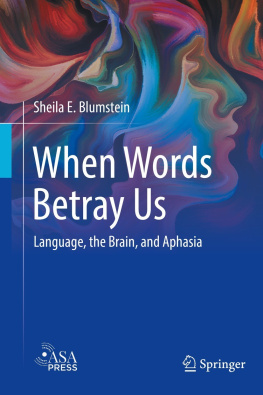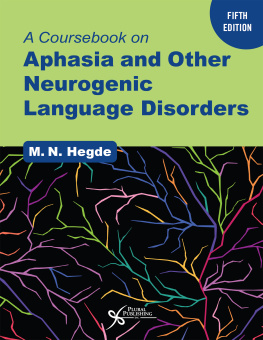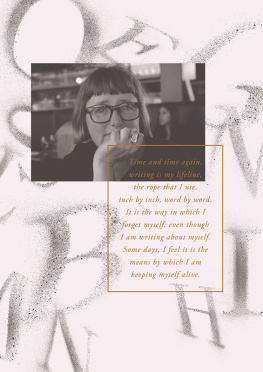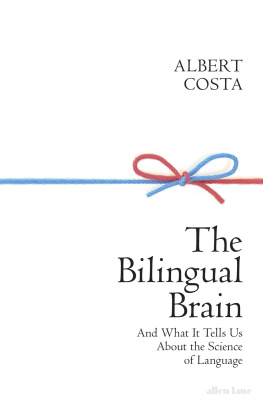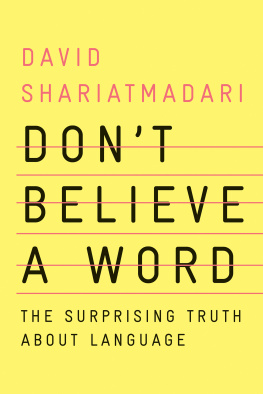Sheila E. Blumstein - When Words Betray Us: Language, the Brain, and Aphasia
Here you can read online Sheila E. Blumstein - When Words Betray Us: Language, the Brain, and Aphasia full text of the book (entire story) in english for free. Download pdf and epub, get meaning, cover and reviews about this ebook. year: 2022, publisher: Springer, genre: Home and family. Description of the work, (preface) as well as reviews are available. Best literature library LitArk.com created for fans of good reading and offers a wide selection of genres:
Romance novel
Science fiction
Adventure
Detective
Science
History
Home and family
Prose
Art
Politics
Computer
Non-fiction
Religion
Business
Children
Humor
Choose a favorite category and find really read worthwhile books. Enjoy immersion in the world of imagination, feel the emotions of the characters or learn something new for yourself, make an fascinating discovery.
- Book:When Words Betray Us: Language, the Brain, and Aphasia
- Author:
- Publisher:Springer
- Genre:
- Year:2022
- Rating:4 / 5
- Favourites:Add to favourites
- Your mark:
- 80
- 1
- 2
- 3
- 4
- 5
When Words Betray Us: Language, the Brain, and Aphasia: summary, description and annotation
We offer to read an annotation, description, summary or preface (depends on what the author of the book "When Words Betray Us: Language, the Brain, and Aphasia" wrote himself). If you haven't found the necessary information about the book — write in the comments, we will try to find it.
When Words Betray Us: Language, the Brain, and Aphasia — read online for free the complete book (whole text) full work
Below is the text of the book, divided by pages. System saving the place of the last page read, allows you to conveniently read the book "When Words Betray Us: Language, the Brain, and Aphasia" online for free, without having to search again every time where you left off. Put a bookmark, and you can go to the page where you finished reading at any time.
Font size:
Interval:
Bookmark:
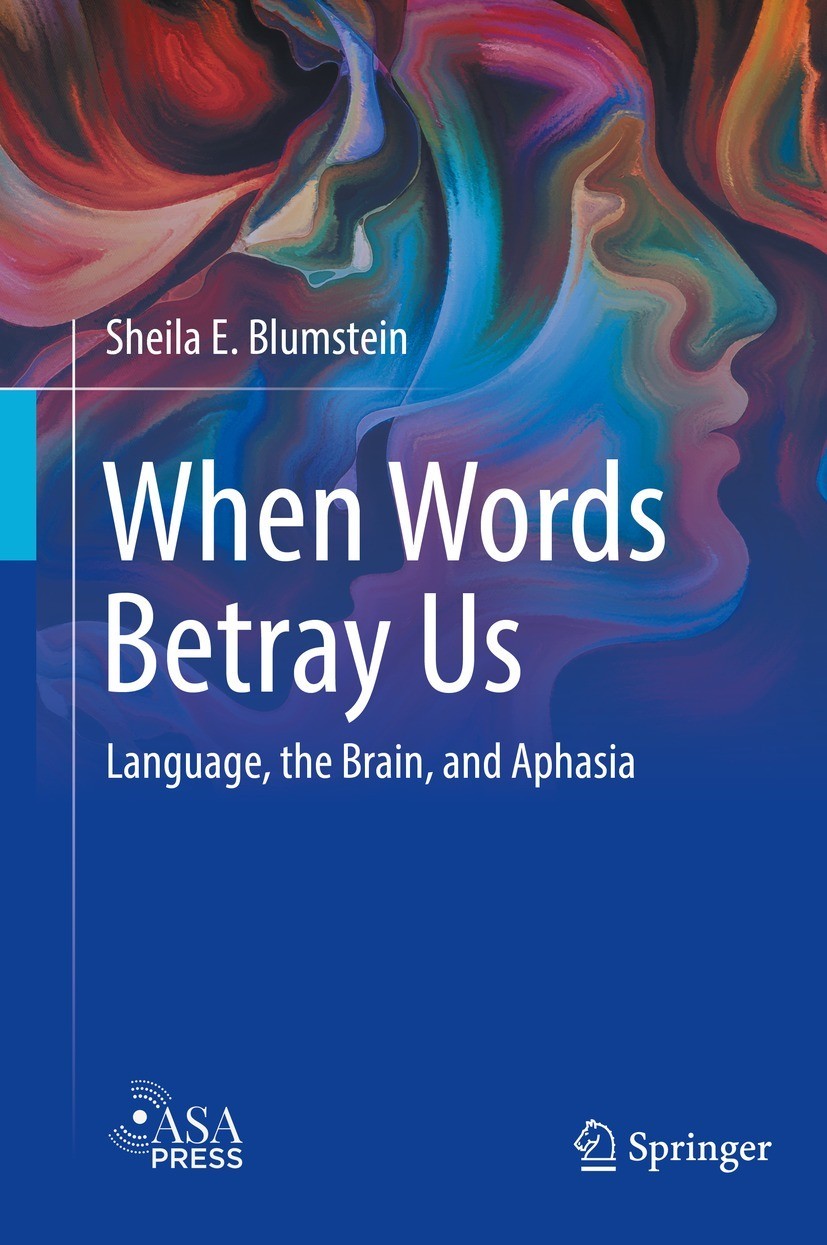

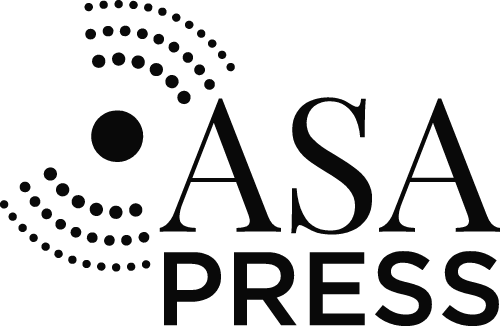
This Springer imprint is published by the registered company Springer Nature Switzerland AG
The registered company address is: Gewerbestrasse 11, 6330 Cham, Switzerland
To all those, here and gone, who made a difference in my life
ASA Press, which represents a collaboration between the Acoustical Society of America and Springer Nature, is dedicated to encouraging the publication of important new books as well as the distribution of classic titles in acoustics. These titles, published under a dual ASA Press/Springer imprint, are intended to reflect the full range of research in acoustics. ASA Press titles can include all types of books that Springer publishes, and may appear in any appropriate Springer book series.
Editorial Board
Mark F. Hamilton (Chair), University of Texas at Austin
James Cottingham, Coe College
Timothy F. Duda, Woods Hole Oceanographic Institution
Robin Glosemeyer Petrone, Threshold Acoustics
William M. Hartmann (Ex Officio), Michigan State University
Darlene R. Ketten, Boston University
James F. Lynch (Ex Officio), Woods Hole Oceanographic Institution
Philip L. Marston, Washington State University
Arthur N. Popper (Ex Officio), University of Maryland
Christine H. Shadle, Haskins Laboratories
G. Christopher Stecker, Boys Town National Research Hospital
Stephen C. Thompson, The Pennsylvania State University
Ning Xiang, Rensselaer Polytechnic Institute
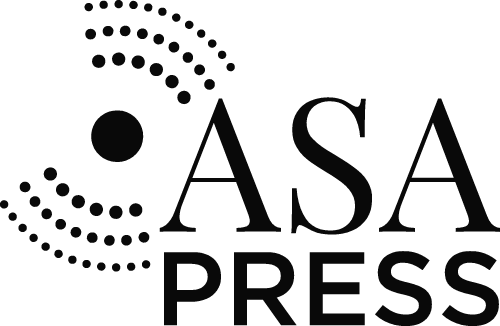
My first introduction to aphasia was personal. At the time I did not know what aphasia was. When I was 19, my grandmother had a stroke. Within days of her stroke, I visited her in her home where she was lying in a hospital bed in her room. She could no longer speak. Although she tried, what came out were incomprehensible syllables. Over time, I could tell from my visits that she was improving. But the improvement was painfully slow. She could not walk on her own, she could say only a few words, and it was not clear how much she understood. Unfortunately, her story did not have a happy ending. She continued to have small strokes, and as a result, her language declined until she ultimately stopped all communication.
At the time, no one gave a name to her disorder. It was not until I was in graduate school that I made the connection when one of my professors, Roman Jakobson, talked about the breakdown of language in adults as a result of brain injury. I realized that my grandmother had had aphasia. It was then that I started reading and wrote my first paper in that course about aphasia. My grandmother may have lost her voice, but it has lived on as her legacy to me in my lifelong interest and commitment to understanding language, the brain, and aphasia.
Having been in the field since 1967 (starting in my second year as a graduate student), one has what I call the long view. Theories come and go, old theories are rediscovered, and new theories are developed. Progress seems infinitely slow but with the long view, one can see that there is real and substantial change. And one also develops a personal perspective. And that is what this book represents. It is not intended to be a historical overview nor a critical analysis of the research of the field, although my worldview has been influenced by and owes much to those before me. It was written with the goal of making it accessible to the non-professional who may have personal experience with someone with aphasia or who is simply interested in learning about how language works, how it breaks down, and how the machinery of the brain makes it all happen.
There are many to thank for the support I have had throughout the years and who have helped bring this book to fruition. The list of people included here is not exhaustive, but it represents those who have deeply influenced and assisted me. First to my mentors of years ago, Roman Jakobson and Harold Goodglass. They provided guidance and support as I learned about aphasia and started my research career. In preparing this book, special thanks go to Carol Fowler and Donald Shankweiler who read drafts of all of the chapters and provided many helpful comments and criticisms; to Ann Marie Clarkson, a talented artist, who drew many of the figures included in the book; and to my colleagues David Badre, Elena Festa, Bill Heindel, and Philip Lieberman and former students, now colleagues, Sara Guediche, Allard Jongman, Sahil Luthra, Emily Myers, Rachel Theodore, and Kathleen Kurowski for many helpful discussions and assistance. Thanks to the Labites, the undergraduate and graduate students and the postdocs, who were part of my lab at Brown University. Many thanks go to the team at Springer and especially to Sam Harrison, a great editor, who gave consistently helpful comments and advice. Finally, my gratitude goes to the many persons with aphasia with whom I worked and who were gracious participants in my research program and also to the National Institutes of Health and the National Institute on Deafness and Other Communication Disorders for supporting my research starting with a predoctoral fellowship in 1968 and continuing throughout my career.
Font size:
Interval:
Bookmark:
Similar books «When Words Betray Us: Language, the Brain, and Aphasia»
Look at similar books to When Words Betray Us: Language, the Brain, and Aphasia. We have selected literature similar in name and meaning in the hope of providing readers with more options to find new, interesting, not yet read works.
Discussion, reviews of the book When Words Betray Us: Language, the Brain, and Aphasia and just readers' own opinions. Leave your comments, write what you think about the work, its meaning or the main characters. Specify what exactly you liked and what you didn't like, and why you think so.

